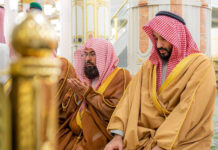By Imam Murtadha Gusau
In the name of Allah, the Entirely Merciful, the Especially Merciful
All praise belongs to He who created and proportioned and who destined and then guided and who brings out the pasture and (then) makes it black stubble. May commendations and protection be upon our chosen Prophet, his household and his companions until the Day of Recompense. To proceed,
Assalamu Alaikum wa rahmatullah wa bara ka tuh
Dear brothers and sisters! Know that “Imam” is an Arabic word which means “Leader.” And Imam here can be the leader of a country (President/Head of state), governor, Sultan or Amir (Emir), who runs administrative tasks of a country, a state or somewhere else. Leader posses some qualities of leadership including qualities of personal character and the ability to motivate others towards the realisation of specific goals are on top of the list. Leadership qualities can easily understand from Qur’an and Sunnah which I’m going to discuss in this sermon In Shaa Allah.
Respected brothers and sisters! Allah Almighty and His Messenger (Peace be upon him) has guided humanity in every sphere of life. They have also guided us in matters of selection of our leader. Different people have different perceptions related to choice of leadership. Some people think a leader should be smart and handsome. Some people think he should be quick and intelligent. Some people think that he should come from a certain political party. Some people think that he should come from a certain region, tribe or group of people. All of these perceptions are wrong! We need to know what Allah and His Messenger (Peace be upon him) has recommended in this regard. Allah Almighty has elaborated the incidence of Prophet Shamwil (Samuel). People of Israel came to him and demanded for a king or leader under whose leadership they could struggle and fight with non believers. Prophet Shamwil (Samuel) told them that Allah Almighty has selected Talut (Saul) as a king for them. They objected on his leadership because he was not wealthy or because of their selfish desire. Prophet Shamwil (Samuel) told them that wealth was not a criteria in choice of leadership. He told them Talut (Saul) deserved to be a king because he was having knowledge and power/strength. This incidence has been narrated in Noble Qur’an in following manner:
“Have you not thought about the group of the Children of Israel after (the time of) Musa (Moses)? When they said to a Prophet of theirs, “Appoint for us a king and we will fight in Allah’s Way.” He said, “Would you then refrain from fighting, if fighting was prescribed for you?” They said, “Why should we not fight in Allah’s Way while we have been driven out of our homes and our children (families have been taken as captives)?” But when fighting was ordered for them, they turned away, all except a few of them. And Allah is All-Aware of the Zalimun (polytheists and wrong-doers). And their Prophet (Shamwil/Samuel) said to them, “Indeed Allah has appointed Talut (Saul) as a king over you.” They said, “How can he be a king over us when we are better fitted than him for the kingdom, and he has not been given enough wealth.” He said: “Verily, Allah has chosen him above you and has increased him abundantly in knowledge and stature. And Allah grants His Kingdom to whom He wills. And Allah is All-Sufficient for His creature’s needs, All-Knower.” [Qur’an, 2: 246-247]
Dear brothers and sisters! It has been reported in the Imam Ibn Kathir’s Tafsir that:
“Imam Mujahid said that the Prophet (mentioned in the Qur’an, 2:246 above) is Shamwil (Samuel). Wahb Bin Munabbih said: The Children of Israel remained on the straight path for a period of time after Prophet Musa (Moses). They then innovated in the religion and some of them even worshipped the idols. Yet, there were always Prophets sent among them who would command them to work righteous deeds, refrain from doing evil and who would rule them according to the commands of At-Taurah (the Torah). When they (Israelites) committed the evil that they committed, Allah caused their enemies to overwhelm them, and many fatalities fell among them as a consequence. Their enemies also captured a great number of them, and took over large areas of their land. Earlier, anyone who would fight the Israelites would lose, because they had At-Taurah (the Torah) and the Tabut, which they inherited generation after generation ever since the time of Musa (Moses), who spoke to Allah directly. Yet, the Israelites kept indulging in misguidance until some king took the Tabut from them during a battle. That king also took possession of the At-Taurah (Torah), and only a few of the Israelites who memorised it remained. The Prophethood halted among their various tribes and only a pregnant woman remained of the offspring of Lavi (Levi), in whom the Prophethood still appeared. Her husband had been killed, so the Israelites kept her in a house so that Allah may give her a boy, who would be their Prophet. The woman also kept invoking Allah to grant her a boy. Allah heard her pleas and gave her a boy whom she called ‘Shamwil (Samuel)’ meaning ‘Allah has heard my pleas.’ Some people said that the boy’s name was Sham’un (Simeon), which also has a similar meaning. As that boy grew, Allah raised him to be a righteous person. When he reached the age of Prophethood, Allah revealed to him and commanded him to call (his people) to Him and to His Tawhid (Oneness). Shamwil (Samuel) called the Children of Israel (to Allah) and they asked him to appoint a king over them so that they could fight their enemies under his command. The kingship had also ended among them. Their Prophet said to them: “What if Allah appoints a king over you, would you fulfill your vow to fight under his command.”
READ ALSO: We’re on the path of sustainable hajj mgt — NAHCON Chair
My respected people! These Qur’anic verses clearly indicates that two important attributes of leadership are: Knowledge and Power/Strength.
Knowledge guides the king or leader to the right path so that he is able to comprehend the situation wisely due to his knowledge and then after probing the situation he should have the power and strength to take decision accordingly. If he does not have power then he is unable to implement his decisions. Power and strength here refers to the psychological, decision and physical power. So any person who is strong in his decisions, and is able to cope with circumstances with bravery he should be chosen as leader.
Besides knowledge and power, justice, patience, sound judgement are also important attributes which should be possessed by the leader. In Surah Sad Allah Almighty has narrated the incidence of Prophet Dawud (AS) who once gave a decision in favour of first party without listening to the opinion of the second party, Allah Almighty corrected him on that instance and guided him that he should listen to the opinion of the second party in future. This incidence has been narrated in Noble Qur’an in following manner:
“We made his kingdom strong and gave him wisdom and sound judgment in speech and decision. And has the news of the litigants reached you? When they climbed over the wall into (his) Mihrab (a praying place or a private room), when they entered in upon Prophet Dawud he was terrified of them, they said: “Fear not! (We are) two litigants, one of whom has wronged the other, therefore judge between us with truth, and treat us not with injustice, and guide us to the Right Way. Verily, this brother (in religion) has ninety nine ewes, while I have (only) one ewe and he says: “Hand it over to me, and he overpowered me in speech.” Prophet Dawud said (immediately without listening to the opponent): “He has wronged you in demanding your ewe in addition to his ewes. And, verily, many partners oppress one another, except those who believe and do righteous good deeds, and they are few.” And Prophet Dawud guessed that We have tried him and he sought Forgiveness of his Lord, and he fell down prostrate and turned (to Allah) in repentance. So we forgave him that, and verily, for him is a near access to Us, and a good place of (final) return (Paradise). O Dawud! Verily! We have placed you as a successor on earth, so judge you between men in truth (and justice) and follow not your desire for it will mislead you from the Path of Allah. Verily! Those who wander astray from the Path of Allah (shall) have a severe torment, because they forgot the Day of Reckoning.” [Qur’an, 38: 20-26]
These Qur’anic verses clearly indicate two other attributes of leadership: Patience and Justice.
Also our beloved Prophet (Peace be upon him) was very conscious about justice and never compromised on it. There is a Hadith narrated by Aisha (RA) which indicates his sensitivity about this justice:
“Aisha (RA), the wife of Allah’s Messenger (Peace be upon him), reported that the Quraish were concerned about the woman who had committed theft during the lifetime of Allah’s Messenger (Peace be upon him), in the expedition of Victory (of Makkah). They said: Who would speak to Allah’s Messenger (Peace be upon him) about her? They (again) said: Who can dare to do this but Usamah Bin Zaid, the loved one of Allah’s Messenger (Peace be upon him)? She was brought to Allah’s Messenger (Peace be upon him) and Usamah Bin Zaid spoke about her to him (interceded on her behalf). The colour of the face of Allah’s Messenger (Peace be upon him) changed, and he said: “Do you intercede in one of the prescribed punishments of Allah? He (Usamah) said: ‘Messenger of Allah, seek forgiveness for me. When it was dusk. Allah’s Messenger (Peace be upon him) stood up and gave an address. He (first) glorified Allah as He deserves, and then said: Now to our topic. This (injustice) destroyed those before you that when any one of (high) rank committed theft among them, they spared him, and when any weak one among them committed theft, they inflicted the prescribed punishment upon him. By Him in Whose Hand is my life, even if Fatimah daughter of Muhammad (Peace be upon him) were to commit theft, I would have cut off her hand. He (the Prophet) then commanded about that woman who had committed theft, and her hand was cut off. Aisha (further) said: Hers was a good repentance, and she later on married and used to come to me after that, and I conveyed her needs (and problems) to Allah’s Messenger (Peace be upon him).” [Muslim]
Again, the Prophet (Peace be upon him) said:
“Those who are fair and just with their families and those who are under their authority will be on Minbars (pulpits) of light on the right hand of Ar-Rahman (Allah), and both His Hands are right Hands.” [Bukhari]
Another important attribute which is to be possessed by the leader is good communication skills. A leader must be excellent in communication so that he can convince people. When Prophet Musa (AS) was bestowed with Prophethood he invoked Allah to bless his brother Harun as his associate, the reason given by Prophet Musa (AS) has been mentioned in Noble Qur’an in the following way:
“And my brother Harun (Aaron) he is more eloquent in speech than me so send him with me as a helper to confirm me. Verily! I fear that they will belie me.” [Qur’an, 28:34]
Similarly piety (At-Taqwah/fear of Allah) and Simplicity are two other important attributes which should be possessed by leader. Allah Almighty has said in the Noble Qur’an:
“Verily, the most honourable of you with Allah is that (believer) who has At-Taqwa [i.e. one of the Muttaqun]. Verily, Allah is All-Knowing, All-Aware.” [Qur’an, 49:13]
The Caliphs (Khulafah) of Messenger of Allah (Peace be upon him) i.e Abubakar, Umar, Usman and Ali (RA) were all pious and simple people but ruled the globe and proved themselves as successful leaders of their age.
Similarly Allah Almighty has commanded believers that they should support people who are truthful. Allah Almighty says:
“O you who believe! Be afraid of Allah, and be with those who are true (in words and deeds).” [Qur’an, 9:119]
Abdullah Ibn Umar (RA) described that the Prophet (Peace be upon him) said about the leadership in these words:
“Behold! Each of you is a guardian, and each of you will be asked about his subjects.” [Bukhari]
And as Muslims, we are all leaders in various matters of life as we can see in Hadith with the words of the Prophet Muhammad (Peace be upon him):
“All of you are shepherds, and each of you will be asked
concerning his flock.” [Bukhari]
So summing up the discussion on the attributes which are to be possessed by the leaders are as follow:
1. Knowledge, wisdom, vision and competence
2. Power/Strength
3. Sound Judgement
4. Patience, Tolerance and forgiveness
5. Justice and fairness
6. Communication skills
7. Piety (At-Taqwah)
8. Simplicity, emotional and spiritual intelligence
9. Truth (Gaskiya)
10. Sound and good health (Soundness in mental and physical condition)
11. Trust (Amanah) and Integrity
12. Consultation
13. Decisiveness (Decision making ability after consultation)
14. Dependence on Allah (Tawakkul), courage, bravery and confidence
15. Spirit of sacrifice
16. Honouring the pledge
17. Generosity
18. Capacity to govern
19. Accountability (Ihtisab)
20. Action not just words
May Allah give us taufiq to choose our leader by keeping in view the attributes pointed out by Allah and His Messenger (Peace be upon him), ameen.
Lastly, I’m reminding you dear brothers and sisters, that Allah Almighty has promised to empower the truth and disgrace the falsehood even if the latter is what is celebrated (by many). And Allah will cause the Truth, Knowledge and Explanation to strike and weaken the falsehood such that its falsity will be clear to all… Allah Almighty said:
“Nay, we fling the Truth against the falsehood, so it destroys it, and behold, it (falsehood) is vanished…” [Surah Anbiyah: 18]
Allah Almighty told us that:
“And do not give the weak-minded (people) your property, which Allah has made a means of sustenance for you, but provide for them with it and clothe them and speak to them words of appropriate kindness.” [Qur’an, 4:5]
And near the end of Surah al-Nur, Allah Almighty says:
“So let those who oppose the Prophet’s command beware, lest fitnah strike them or a painful punishment.” [Qur’an, 24:63]
Ya Allah! Make us to see the truth as the truth and enrich us with following it; make us to see the falsehood as falsehood and enrich us with abandoning it, ameen.
All praise is due to Allah, the Lord of all creation; may Allah extol the mention of our noble Prophet Muhammad in the highest company of Angels, bless him and give him peace and security―and his family, his Companions and all those who follow him correctly and sincerely until the establishment of the Hour.
Murtadha Muhammad Gusau is the Chief Imam of Nagazi-Uvete Jumu’ah and the late Alhaji Abdur-Rahman Okene’s Mosques, Okene, Kogi State, Nigeria. He can be reached via: gusauimam@gmail.com or +2348038289761.
This Jumu’ah Khutbah (Friday sermon) was prepared for delivery today Friday, Rajab 17, 1444 AH (February 10, 2023).























